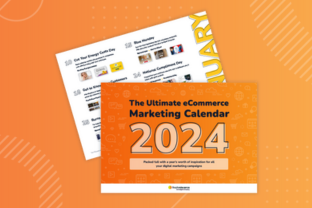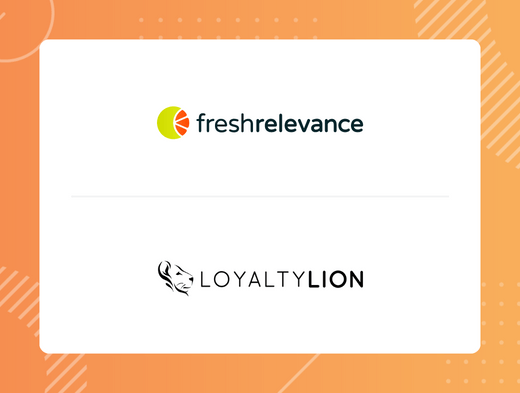Ecommerce has never been more exciting or more rewarding. With customers having endless options at their fingertips, they crave personalized experiences that resonate. Thanks to advancements in technology, marketers have a breadth of data of which can be used to trigger engaging experiences across marketing channels. When you connect with shoppers in the right way, the results can be truly transformative.
Picture your email campaigns gaining traction month after month: higher open rates, stronger conversions, and campaigns that genuinely move the needle. Segmentation and A/B testing aren’t just tactics; they’re your secret weapons for unlocking deeper engagement and meeting customer needs more effectively than ever before.
However, to sustain this growth and create more meaningful customer interactions, future-forward marketers need to take it a step further.
That’s where personalized marketing steps in.
By harnessing customer data and real-time insights, personalized marketing enables you to craft tailored messages, offers, and experiences that resonate with each individual customer. Whether it’s through email, your website, or across multiple channels, personalization gives you the power to build stronger connections, drive engagement, and boost conversions. It’s the key to turning underperforming campaigns into lasting customer relationships that drive growth.
As an ecommerce marketing manager, you understand that real success goes beyond sending more emails. It’s about creating tailored, scalable experiences that drive results. By embracing smart, data-driven strategies, you’re not just keeping up; you’re leading the way in a highly competitive landscape.
In this blog, we’ll explore the transformative impact of personalized marketing and show you how to implement it effectively at scale to elevate your ecommerce strategy.
Transform customer relationships with the power of personalized marketing
Personalized marketing doesn’t just drive conversions; it builds lasting customer loyalty. By offering tailored experiences that show customers you truly understand their needs, you create deeper, more meaningful connections. When customers feel valued, they’re more likely to return, make repeat purchases, and even recommend your brand to others. This personalized approach transforms one-time buyers into long-term advocates who stick with your brand because they trust that every interaction will be relevant and valuable to them.
Why personalization matters in modern marketing
Personalized marketing has become a necessity for ecommerce brands aiming to drive meaningful customer engagement. It’s no longer just about pushing products or promotions; it’s about creating tailored experiences that resonate with each individual customer. By leveraging personalization, brands can see significant improvements in key performance metrics such as average order value (AOV), conversion rate (CR), and customer lifetime value (LTV), all of which directly contribute to increased revenue.
Customers are more likely to respond to marketing that feels relevant to them. Whether it’s a product recommendation based on previous purchases or a personalized email reminder about an abandoned cart, personalization makes customers feel valued and understood. This sense of connection transforms one-time buyers into loyal customers who continue to engage with your brand.
Techniques for implementing personalized marketing at scale
Implementing personalized marketing may seem daunting, especially for ecommerce managers juggling multiple tasks. However, with the right tools and strategies, personalization can be both scalable and impactful. Let’s explore some key techniques that ecommerce brands can implement to transform their customer relationships through personalized marketing.
Segmentation for more targeted campaigns
Segmentation is the foundation of effective personalized marketing. By grouping customers based on shared characteristics, such as purchase history, browsing behavior, or demographics, brands can create more relevant and engaging campaigns. Instead of sending the same message to your entire email list, segmentation allows you to tailor content that speaks directly to the needs and interests of each group.
For example, a customer who frequently purchases tech gadgets might appreciate an exclusive discount on the latest gadgets, while a customer who has shown interest in fitness gear may be more likely to engage with recommendations for new fitness products. By creating these tailored experiences, you can increase customer engagement and drive higher conversion rates.
Dynamic content for real-time personalization
Dynamic content takes personalization a step further by allowing you to deliver real-time, personalized experiences on your website and in emails. This means that instead of showing the same content to every visitor, your content can be adapted based on each customer’s behavior, location, or preferences.
For example, if a customer is browsing your site and is looking at winter coats, you can dynamically display related products like scarves or gloves on the homepage the next time they visit. Similarly, dynamic content in emails can showcase products that the customer recently viewed or recommend items based on their previous purchases.
Remember, the key to fostering this loyalty is consistency. Make sure personalization extends across every channel: email, website, SMS, and beyond. A customer who receives a personalized product recommendation in an email should see the same relevant content when they visit your website. This consistency helps create a seamless experience, further strengthening their trust in your brand.
By serving up content that is immediately relevant to the customer, you increase the chances of conversion while creating a seamless, engaging shopping experience.
Using an ecommerce personalization platform, marketers are able to deploy a variety of dynamic content formats across the important channels.
Triggered emails to combat cart abandonment
Cart abandonment is one of the biggest challenges in ecommerce, with 70 percent of carts left abandoned before purchase. This results in a significant loss of potential sales. Personalized, triggered emails are a powerful tool to re-engage these customers and nudge them toward completing their purchase.
These emails can be highly effective when personalized with the specific items left in the cart, combined with tailored product recommendations or limited-time discounts to create urgency. By reaching out at the right moment with relevant content, you significantly increase the chances of turning an abandoned cart into a completed sale, ultimately recapturing lost revenue.
For instance, B2B company HTS Spares implemented a two-stage cart abandonment program using Fresh Relevance, generating an impressive £394K in revenue over the last nine months alone. This case shows how a well-executed cart recovery strategy can make a massive difference in recapturing lost sales and boosting overall revenue.
Pop-ups and social proof to build trust
Pop-ups, when used strategically, can be a highly effective tool for driving conversions and enhancing personalization. The key is to avoid overwhelming visitors with generic, one-size-fits-all pop-ups that feel intrusive. Instead, brands should personalize these messages to align with each user’s behavior and where they are in the customer journey. For example, a first-time visitor might be greeted with a welcome discount code to incentivize their initial purchase, while a returning customer could receive a gentle reminder about the items still waiting in their cart.
Personalized pop-ups can also be tailored based on browsing history. If a visitor has been exploring a particular product category, a targeted pop-up could display recommendations or special offers for those items. By delivering the right message at the right time, pop-ups can serve as an unobtrusive yet persuasive nudge that encourages the customer to take action.
Adding social proof to these pop-ups can take their effectiveness to the next level. Showcasing real-time activity, such as how many people have recently purchased a product, creates a sense of urgency and trust. Customers are more likely to follow through with a purchase when they see that others are engaging with the same products. Reviews and testimonials are another powerful form of social proof. By displaying positive feedback from other buyers, you reassure potential customers that they’re making a smart choice.
For example, a pop-up that highlights, “5 people purchased this item in the last hour!” can create a fear of missing out (FOMO) that drives customers toward immediate action. Likewise, adding a line such as, “Rated 4.8 stars by 300+ happy customers,” reinforces trust and confidence in the product.
When done right, personalized pop-ups combined with social proof help build trust, reduce purchase hesitation, and guide visitors toward completing their transactions, making the shopping experience feel more relevant and customer-focused.
Utilizing AI and Machine Learning for Personalization
AI and machine learning have revolutionized how ecommerce brands approach personalization. These advanced technologies allow for real-time data analysis, helping brands create predictive, data-driven experiences that are tailored to each customer’s unique behavior and preferences. By leveraging AI, ecommerce managers can efficiently scale their personalization efforts and deliver hyper-relevant content without requiring extensive manual work.
Here are four key ways AI and machine learning enhance personalized marketing:
1. Predictive Product Recommendations
AI can analyze vast amounts of customer data, such as browsing history, purchase behavior, and preferences, to make highly accurate product recommendations. These suggestions are tailored to what a customer is most likely to purchase next, based on their own actions or similar customers’ behavior. This not only increases the chances of conversion but also boosts average order value (AOV) by recommending complementary products. This kind of predictive power isn’t just theoretical; it has delivered real-world success for many brands. For example, Golf Clubs 4 Cash saw a 49% increase in website conversion rates by using AI-powered product recommendations. Even more impressive, over 40% of their sales conversions were directly attributed to Fresh Relevance technology, showing just how effective tailored product suggestions can be in driving ecommerce growth.
2. Optimized Email Send Times
One of the challenges in email marketing is determining the best time to send emails for maximum engagement. AI can analyze individual customer data to predict when each customer is most likely to open and engage with an email. By optimizing send times for each recipient, AI can significantly improve open rates and click-through rates (CTR), ensuring that emails are delivered at the moment they’re most likely to make an impact.
3. Real-Time Personalization Across Channels
AI enables brands to deliver real-time personalized experiences not just through email, but across channels such as websites, mobile apps, and even SMS. By tracking and analyzing a customer’s behavior in real time, AI can dynamically adjust the content, offers, or product recommendations shown to them. For example, a customer who has been browsing winter coats can instantly see personalized recommendations for related products, such as scarves or gloves, on their next visit to the site.
4. Cold Start Personalization for New Visitor
With AI, brands can overcome the challenge of personalizing experiences for first-time visitors. Using machine learning algorithms, AI systems can analyze data from previous new visitors with similar behaviors and apply those insights to predict what the new visitor might be interested in. This “cold start” personalization ensures that even customers with little to no data history are greeted with relevant and engaging content, which improves their chances of converting.
Conclusion
Personalized marketing has the power to transform how customers interact with your brand. By tailoring experiences to individual preferences and behaviors, you can strengthen relationships, improve key ecommerce metrics like AOV and conversion rates, and ultimately increase revenue. Implementing scalable personalization techniques, such as segmentation, dynamic content, and AI-powered automation, ensures that each customer feels valued, leading to long-term loyalty and engagement.
With tools like Fresh Relevance by Dotdigital, ecommerce managers can streamline their personalization efforts, driving growth while fostering meaningful connections with customers. Now’s the time to harness the full potential of personalized marketing and see the transformative impact it can have on your customer relationships.
Want to see our powerful website personalization features in action? Click below to access an instant platform demo.






